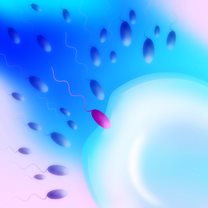Sperm DNA damage
 Why it is important for your treatment
Why it is important for your treatment
You and your partner (or donor) are each going to give some of your DNA to your baby. This is what makes a babies look and act like their parents.
What is sperm DNA damage?
Research shows that sperm quality is not as good as it was. This is one of the reasons for increasing infertility around Europe. There are many causes for this like smoking, poor diet and environmental pollutants. All of these produce reactive oxygen species which can damage the DNA of your sperm.
Sperm DNA damage can lead to
- Fewer eggs being fertilized
- Embryos not developing as well as they should
- Lower pregnancy rates
What if the semen analysis is normal? Can testing for sperm DNA damage help decide what treatment is best for you?
Recent research shows that that there is little correlation between a traditional semen analysis result and the amount of DNA damage in your sperm. So, even if your sperm counts are normal you may have DNA damage in your sperm this means that just because a man has a normal semen analysis, he may not be able to get his partner pregnant.
Sperm DNA testing can guide to a diagnosis for the man and give more information for your treatment choice
What do sperm DNA damage results mean?
- If there is less than 25% damage: men do not have a significant problem sperm DNA damage
- If there is more than 25% damage: these men have a high risk of infertility and so are less likely to get their partners pregnant naturally. Also, IUI will be unlikely to work for them.
- If there is between 26-49% damage: these men have a high chance of success with IVF
- If there is over 50% damage: these men have a high risk of failure with IVF treatment.
- If treatment is planned, intracytoplasmic sperm injection (ICSI) is more likely to be successful than IVF if sperm DNA damage is above this value.
- If there is over 50% damage and you have had failed ICSI treatment already: If you fall into in this group, you may wish to talk to your fertility specialist about ICSI with surgically retrieved sperm. Unfortunately, this is an invasive procedure but it may give you a better success rate. If ICSI has failed with ejaculated sperm and you do not wish to have sperm retrieved surgically, the only alternative is donor sperm.